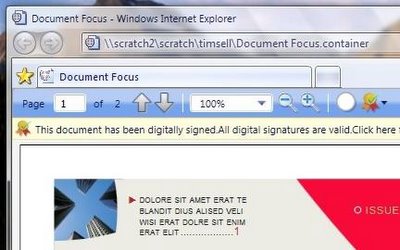 Microsoft XPS Document format (earlier Metro), similar in many ways to Adobe PDF, is all set to debut with Windows Vista and Office 12.
Microsoft XPS Document format (earlier Metro), similar in many ways to Adobe PDF, is all set to debut with Windows Vista and Office 12.Microsoft XPS is designed as a direct competitor to Adobe PostScript and PDF, the de-facto standard document format on the Web. Just like PDF, an XPS document is displayed identically on every computer and will represent the "printed page"
Read: How does Microsoft XPS Metro compare with Adobe Acrobat PDF
Microsoft will also provide an XPS Viewer similar to Adobe Acrobat Reader for viewing XPS documents without needing the actual application which created it. Microsoft XPS reader is available for Windows Vista, Windows XP, and Windows Server 2003.
The Microsoft XPS Document Writer (MXDW) will also be compatible with Windows XP but the current version of MXDW that is available in the SDK of the WinFX CTP is compatible with the WinFX CTP only.
Will Microsoft XPS be able to dislodge Adobe PDF ?
Microsoft XPS success will actually depend on how quickly software vendors and printing hardware manufacturers agree for the development of XPS devices and drivers. And according to Alex Woodie, software developers have started to jump onto Microsoft's XPS bandwagon.
Both Zoran and Software Imaging are developing new products that support the XPS format. Charles LeCompte of Lyra Research also says XPS has a shot at taking some of the shine off PDF.
Andy Simonds posted a screenshot of Microsoft XPS viewer

Microsoft will also release a stand-alone viewer (not integrated into IE) that will also be supported from Windows Vista through Windows 2000. XPS Viewers will also be available for Mac, Linux and Unix platforms.
Microsoft XPS viewer is built on top of Windows Presentation Foundation. Hence, it works on all platforms that support WPF - Vista, Windows XP and Windows Server 2003.
XPS has the potential to grab PDF marketshare but Microsoft Windows Vista is still couple of months away and Adobe is anyway not going to sit idle during this time. Lot of activity is already happening in Adobeplex - they just announced Acrobat 3D, LightRoom and Adobe CS Production Studio.